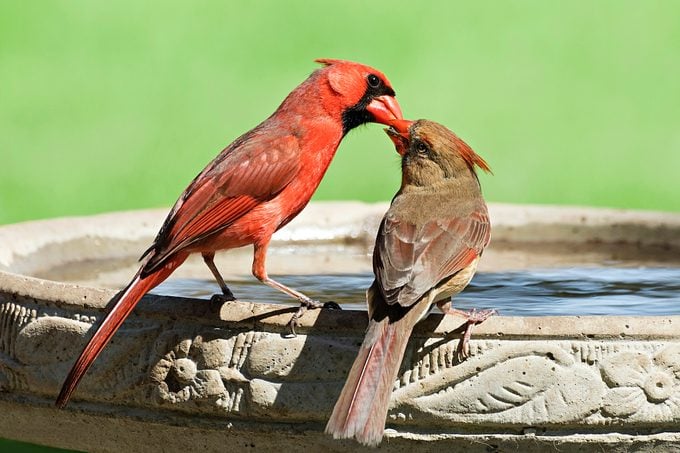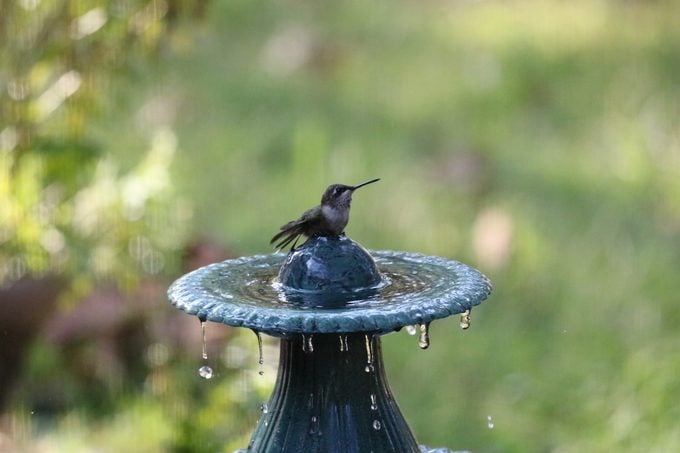How to Clean a Birdbath the Right Way
Updated: May 09, 2024
Offer clean water for your birds. Experts explain the best ways how to clean a birdbath and how to keep algae from growing in the water.

On This Page
Clean a Birdbath With Bleach
Janice Ruesch of Farport, New York, says, “I clean my birdbaths many times during the summer, but it seems like they’re not actually getting clean. What is the proper way to clean a birdbath?”
Birding experts Kenn and Kimberly Kaufman say, “Depending on the material your birdbath is made from, a mixture of water and bleach can be an effective cleaning solution. If you’re in doubt about how well the material will hold up, be sure to test a small area first before cleaning the whole bird bath.”
Did you know: Changing the water in your birdbath every few days will help keep algae from growing, making it easier to clean in the long run.
Learn how (and how often) to clean bird feeders.
How to Clean a Concrete Birdbath

- If the birdbath is made of concrete, empty out the water.
- Using a hose with a high-pressure nozzle, spray off any built up algae or dirt.
- Add water to the birdbath until it’s almost full. Then add 1 to 1 1/2 cups of bleach.
- Cover the entire bath with a black trash bag to prevent any birds from getting to the bleach water.
- Allow it to soak for 10 to 15 minutes.
- Remove the plastic bag.
- Carefully drain the bleach water mixture in a safe area.
- Then rinse the bath for a few minutes with fresh water until you can no longer detect the smell of bleach.
Learn how to attract birds to use a bird bath.
How to Clean a Birdbath With Vinegar
You can also freshen up your backyard birdbath in a snap with vinegar. Just rinse off the surface and scrub out the basin with nine parts water to one part vinegar.
Learn how to repair a cracked birdbath.
How to Keep Algae out of a Birdbath

Patricia Sparks of Helendale, California, asks: “I’m careful to properly clean my birdbaths, but algae is still a problem. What should I do?”
Kenn and Kimberly Kaufman say, “Algae grow in standing water. It’s important to clean and change the water in birdbaths every few days. In hot weather, we change the water in our birdbaths every day, scrubbing with a stiff brush and rinsing thoroughly before refilling.
If algae continue to be a problem after proper cleaning, you might need to move your birdbaths to a different location. It’s best to keep them out of full sun. But avoid putting them directly under trees or shrubs where plant parts may drop directly into the water.
Moving water also helps prevent algae, so consider adding a solar fountain or dripper, which will help attract more birds too.”
“Is there a product to reduce algae growth in water fountains while also being safe for birds, tree frogs, toads and other small animals that drink from them?” asks reader Karen Zwicker of Litchfield, Illinois.
Kenn and Kimberly say, We don’t favor chemicals to control algae. Their effects on wildlife may not be fully known. Regular cleaning is a safer approach.”
Next, learn how to clean hummingbird feeders.
About the Experts
- Kenn and Kimberly Kaufman are the official birding experts for Birds & Blooms. They are the creators of the Kaufman Field Guide series and they speak and lead birding trips all over the world.
Why Trust Us?
For nearly 30 years, Birds & Blooms, a Trusted Media Brand, has been inspiring readers to have a lifelong love of birding, gardening and nature. We are the #1 bird and garden magazine in North America and a trusted online resource for over 15 million outdoor enthusiasts annually. Our library of thousands of informative articles and how-tos has been written by trusted journalists and fact-checked by bird and garden experts for accuracy. In addition to our staff of experienced gardeners and bird-watchers, we hire individuals who have years of education and hands-on experience with birding, bird feeding, gardening, butterflies, bugs and more. Learn more about Birds & Blooms, our field editor program, and our submission guidelines.





















